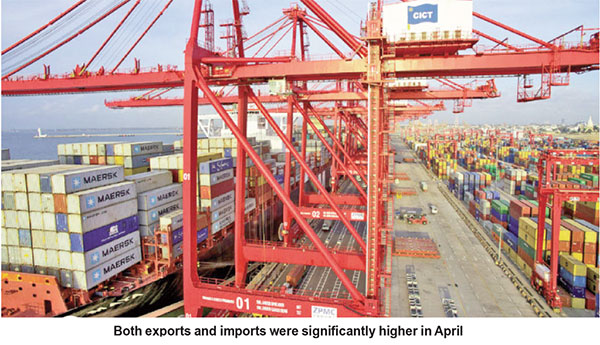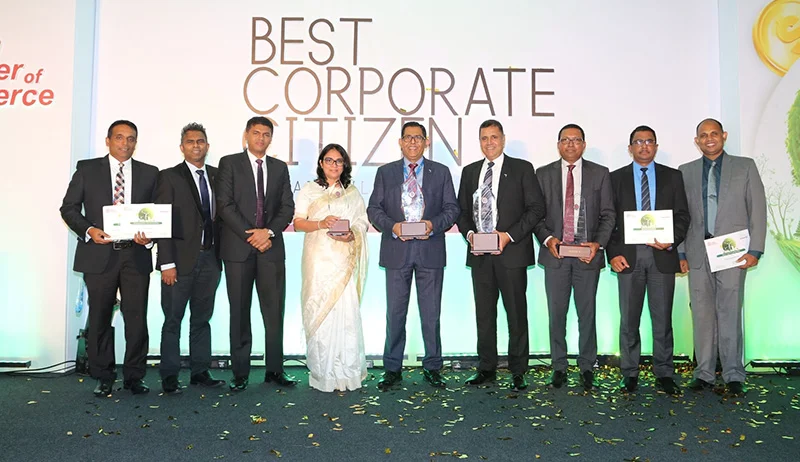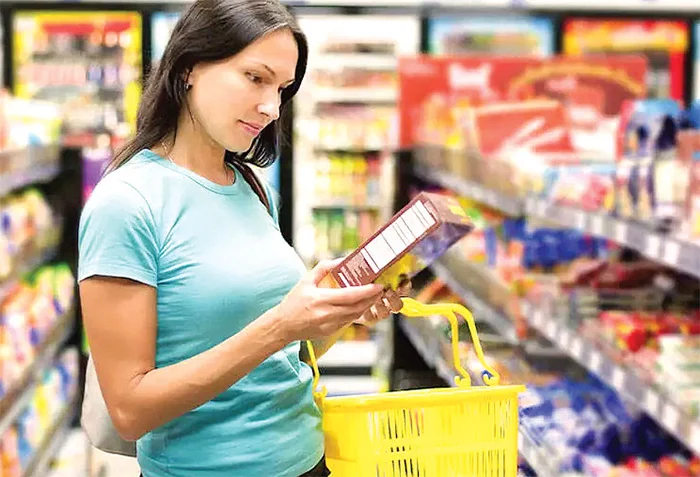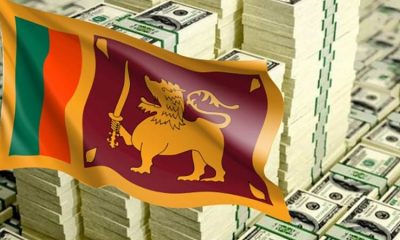Business
Deficit in trade account during January- April widened to $ 2.94 billion

The cumulative deficit in the trade account during January – April widened to $ 2.94 billion from $ 2.69 billion recorded over the same period in 2020.
Central Bank said both exports and imports were significantly higher in April, compared to the lockdown period in April 2020, although both were lower compared to March. Cumulatively, exports were up 29.6% to $ 3.8 billion in the first four months of 2021, whilst imports were up 20% to $ 6.7 billion of which non-fuel imports were up 17.6% to $ 5.35 billion.Central Bank said the major contributory factors for this outcome were sharp rise in value of fuel imports, machinery and equipment, textiles and textile articles, chemical products and plastics and articles thereof. Recording the highest ever value for a month of April, earnings from merchandise exports in April increased by 189.8% to $ 818 million, from a significantly low value of $ 282 million recorded in April 2020 amidst the island wide lockdown measures due to the first wave of the COVID-19 pandemic.Earnings from exports in April, however, were 25.2% lower than the export earnings of $ 1,094 million recorded in March, reflecting the impact of the beginning of the third wave of the pandemic and the festive holiday-related developments in April.Earnings from all subsectors of industrial goods exports improved substantially by 302.5% to $ 647 million in April, YOY. On a month-on-month basis, earnings from industrial exports declined by 22.0%, except for the subsector of petroleum products; leather, travel goods and footwear (mainly footwear); animal fodder (mainly dog/cat food); and printing industry products (mainly currency notes). Earnings from textiles and garments; rubber products; machinery and mechanical appliances; and gems, diamonds and jewellery mainly recorded declines compared to March. Meanwhile, earnings from the export of petroleum products improved in April over the preceding month due to higher exports of naphtha, while earnings from bunker and aviation fuel declined with the significant reduction in volumes of aviation fuel and bunkering fuel supplied to aircraft and ship arrivals, despite the increase in the average prices of these export products.Export earnings from all subsectors related to agricultural goods increased by 37.7% to $ 165.6 million in April, compared to a year ago, though contracted by 35.6% compared to March. Despite higher export prices, export earnings from tea declined substantially compared to the previous month due to lower export volumes. In addition, export earnings from spices (mainly cinnamon, pepper and cloves), coconut (both kernel and non-kernel products), seafood and minor agricultural products declined notably in April over March. Earnings from all subsectors under mineral exports were also higher in April (by 332.9%) than export earnings in April 2020, but lower (by 10.3%) than export earnings in March. The decline in April over March reflected lower earnings from subsectors of earths and stone (mainly quartz), and ores, slag and ash (mainly titanium ores).The export volume index and the unit value index increased by 182.0% and 2.8%, respectively, on a YOY basis, in April. This indicates that the increase in export earnings was due to the combined impact of higher export volumes and prices.Expenditure on merchandise imports in April increased by 52.1% to $ 1.7 billion from low import expenditure of $ 1.12 billion in April 2020, when the effects of the first wave of the pandemic and low global petroleum prices were present. The YOY increase in the import expenditure was driven by the increase in imports of intermediate and investment goods. However, import expenditure in April was considerably lower (by 11.4%) compared to March ($ 1.92 billion), although import values in both March and April were higher than pre-pandemic levels.With declines recorded in both food and beverages and non-food consumer good categories, expenditure on the importation of consumer goods in April declined by 7.9%, compared to April 2020 and by 26.6% compared to March.
Business
CBSL raises Rs. 120 billion at the T-Bill auction

Average yield rates decline across the board for third consecutive week
Market participants in the secondary market exhibited mixed sentiment, pivoting from the dull sentiment on Tuesday, observing thin trading volumes and limited market activity, according to First Capital Research.
The secondary market yield curve edged down slightly by 5bps across 3M, 6M and 1Yr maturities, following the weekly T-Bill auction results. The Central Bank of Sri Lanka (CBSL) conducted its weekly T-Bill auction on Tuesday, successfully raising LKR 120.0 Bn, with the total offered amount being fully accepted across all maturities, the research organisation said.
The 1Yr bill attracted the most interest, while weighted average yield rates declined across the board for the third consecutive week. The 03M bill closed at 8.62% (04bps), the 06M bill at 8.77% (-04bps), and the 1Yr bill at 8.96% (-06bps).
Amongst the traded maturities, 15.09.27 traded at a range of 9.85% to 9.80% whilst 15.02.28 and 15.03.28 traded in the range of 10.15% to 10.10% and both the maturities 01.05.28 and 01.07.28 traded between 10.05% to 10.03%.
Meanwhile, on the external front, the LKR depreciated against the USD, closing at LKR 295.61/USD compared to LKR 293.17/USD recorded the previous day.
Similarly, the LKR depreciated against other major currencies such as the GBP, EUR, AUD, CNY, and JPY.
CBSL holdings of government securities remained unchanged, closing at LKR 2,515.62Bn on Tuesday.
Overnight liquidity in the banking system contracted to LKR 159.37Bn from LKR 197.51Bn recorded the previous day.
On Tuesday, the stock market experienced a day of volatility, driven by mixed sentiment among investors. The index opened in negative territory but recovered after the first hour of trading, supported by increased activity in the Banking sector and prominent blue-chip stocks, First Capital Research said.
Business
HNB recognised for 15 years of excellence in corporate sustainability at BCCSA 2024

HNB PLC, was once again ranked among Sri Lanka’s Top 10 Best Corporate Citizens at the Ceylon Chamber of Commerce (CCC) Best Corporate Citizen Sustainability Awards (BCCSA) 2024.
Notably, this marks the 15th consecutive year HNB has earned this sought-after distinction, underscoring its enduring leadership in sustainability, corporate responsibility, and governance.
In addition to being placed among the Top 10 Best Corporate Citizens, HNB received three more prestigious accolades at the BCCSA 2024 awards, including recognition under the Triple Bottom Line Profit category, the Category Award for Economic Contribution, and the Best Project Sustainability award.
Commenting on the significance of the Bank’s outstanding performance at this year’s awards, HNB Managing Director/CEO, Damith Pallewatte said: “Our nation has reached a critical juncture. Moving forward, it is imperative that public and private sectors shoulder greater responsibility in the broader national effort to drive inclusive, sustainable development. This award serves as another important validation of HNB’s own efforts to lead this change, and we remain committed to serving as a steadfast partner in progress to all Sri Lankans.”
HNB’s success at BCCSA was attributed to its strategic focus on delivering efficient, ethical, and sustainable banking solutions to all segments of Sri Lankan society. Driven by an unwavering focus on securing equitable local and global partnerships that uplift both the rural and national economy.
Most recently, HNB has championed initiatives in green financing and sustainability, technological innovation, and community development, including facilitation of investments into critical infrastructure, and healthcare.
This includes pioneering initiatives like HNB Sarusara, which aim to transform Sri Lanka’s agricultural sector, boost national food security, and improve livelihoods for farmers across Sri Lanka.
Through the Sarusara Programme, HNB is committed to revitalizing Sri Lanka’s agriculture sector, uplifting rural economies, and enhancing national food security. Since launching in 2024, the programme as already engaged approximately 30,000 agripreneurs across the country by modernizing their agricultural practices and improving business outcomes. It promotes the adoption of cutting-edge agricultural techniques and technologies to enhance efficiency and yields, while supporting market access and export opportunities.
With Sarusara, HNB offers tailored financial products and services specifically designed to meet the needs of agripreneurs, thereby facilitating easier access to funding for agricultural ventures. Additionally, training and skill development are integral components of the program, equipping agripreneurs with the knowledge required to thrive in a competitive market.
Together with an exemplary record on transparency, accountability, and governance, HNB continues to set new benchmarks in banking and corporate excellence.
Business
Healthwashing, farmwashing, greenwashing and even sanewashing

by Sanath Nanayakkare
The UK government has woken up to the practice of healthwashing that some companies indulge in marketing their products by adding certain attributes in the marketing spin, according to an article in the Cambridge dictionary blog.
“Healthwashing is a practice where products such as food and vitamins are labelled in a way that suggests they are healthier than they actually are. By doing this, they increase the price of the product by a significant percentage and prey on the consumers by taking advantage of their health concerns,” it notes.
Delving deeper into the less than honest practice of using the suffix- washing- in marketing spin, the blog points out that Farmwashing is another practice where a company gives the impression that its products come from small, local, family-run farms, when this is not actually the case. Organic veg box company Riverford has teamed up with a group of British farmers to launch a new fairness campaign called “Farmers Against Farmwashing” aimed at exposing misleading supermarket “farmwashing” practices – where major supermarkets use fake farm brands and the overuse of the Union Jack to give shoppers the impression that their products come from quaint British family farms. However, much of the food is increasingly sourced from industrial mega farms or from overseas,”
“Meanwhile, Sanewashing is a practice where journalists or public figures portray someone with extreme ideas or policies as more reasonable and moderate than they actually are, in order to make the person more acceptable to a bigger number of people, The Poynter Institute, a journalism nonprofit, defines “sanewashing” as “the act of packaging radical and outrageous statements in a way that makes them seem normal.” “Sanewashing” is unusual in that it began not with politicians but with journalists, the Columbia Journalism Review suggests, or with people who pride themselves on not using clichés,” it notes.
Last but not least, greenwashing in marketing and advertising involves taking an existing product or service and spinning its environmentally friendly virtues even if there are none. It is hoped that Sri Lankan policymakers will also be alert and aware and watch such trends with the keenest of eyes.
-

 Sports7 days ago
Sports7 days agoSri Lanka to mend fences with veterans
-

 Sports5 days ago
Sports5 days agoPathirana set to sling his way into Kiwi hearts
-

 Opinion7 days ago
Opinion7 days agoIs AKD following LKY?
-

 News3 days ago
News3 days agoOffice of CDS likely to be scrapped; top defence changes on the cards
-

 News6 days ago
News6 days agoSL issues USD 10.4 bn macro-linked bonds
-

 Opinion7 days ago
Opinion7 days ago‘A degree is not a title’ – a response
-

 Editorial6 days ago
Editorial6 days agoRanil’s advice
-

 Editorial7 days ago
Editorial7 days agoLest watchdogs should become lapdogs











